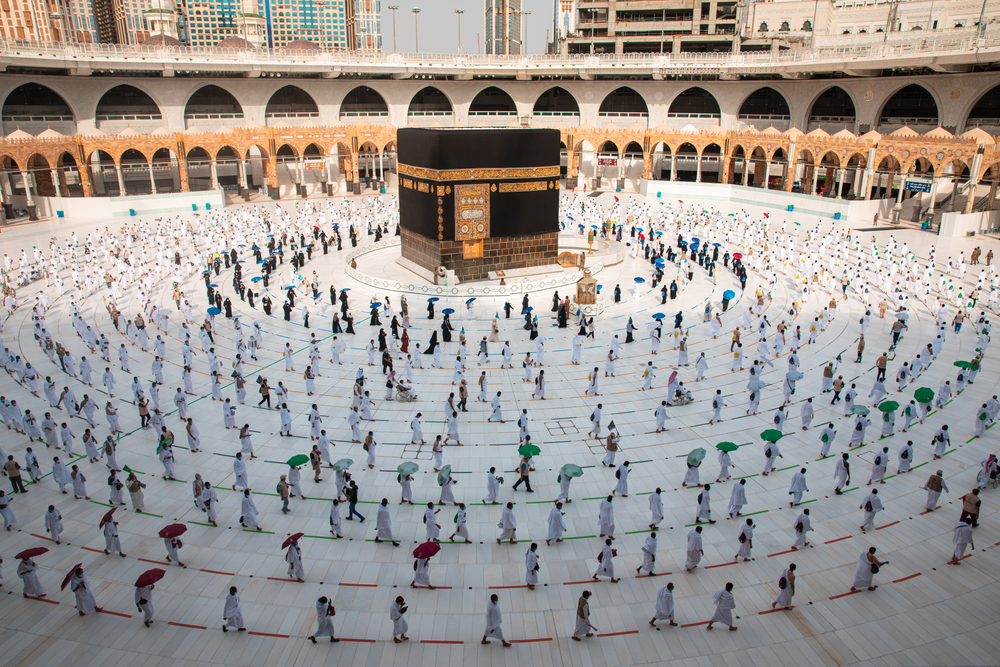What Is the Purpose and Virtues of the Ka’ba?
Answered by Mawlana Ilyas Patel
Question
I will be going to umrah soon, and alhamdulillah, I don’t have any doubts about Allah and his Prophet (Allah bless him and give him peace), but I’m more so confused about what the point of the K’aba is. When I’m at the K’aba, am I physically closer to Allah? I know Allah transcends time and space, but when I look at the K’aba, should I look to the sky and make a dua? Or should I look at the K’aba and make dua? Also, I remember someone saying the arsh/throne of Allah is directly above the K’aba. If this is true, all my confusion will go away immediately, but I’m not sure if this is true. Could you also explain the virtues and acceptance of dua at the K’aba?
Answer
In the Name of Allah, the Most Merciful and Compassionate
I pray you are in good faith and health.
The Purpose and Virtues of the K’aba
The Kaba is a symbol of Allah Most High to give the worshippers a sense of oneness and unity to worship only One worthy of worship from all four corners. Thus it provides focus and one direction and focal point for the entire Muslim world, but not as an object of worship.
Mujahid (Allah be pleased with him) reported, Ibn Umar (Allah be pleased with him) said, “Allah Almighty created four things with His hand: Adam, upon him be peace, the Throne, the Pen, and the Gardens of Eden. Then, He said to the rest of creation, ‘Be’ and it was.” [Ajurri, al-Shari’a]
Allah Most High said, “To Allah belong the east and the west, so wherever you turn you are facing towards Allah. Surely Allah is All-Encompassing, All-Knowing.” [Quran, 2:115]
Acceptance of Duas upon Seeing the Ka’ba
Abu Umama (Allah be pleased with him) reports that the Prophet (Allah bless him and give him peace) said, “The doors of the sky open and duas are accepted on four occasions, when the armies clash in war, when rain falls, at the time of iqama for salat and when looking at the Ka’ba.” [Tabarani, al-Mu’jam al-Kabir; Bayhaqi, Sunan al-Kubra; Haythami, Majma al-Zawaid]
120 Mercies Descend on the K’aba
‘Abdullah ibn ‘Abbas (Allah be pleased with him) reports the Prophet (Allah bless him and give him peace) said, “One hundred and twenty mercies descend upon the Ka’ba every day and night; sixty for those performing tawaf, forty for those engaged in Salat and twenty for those who are merely looking at the Ka’ba.” [Tabarani, al-Mu’jam Al-Kabira/al-Mu’jam al-Awsat; Bayhaqi, Shu’b al-Iman]
One Hundred Levels in Paradise beneath the Throne
Mu’ad ibn Jabal (Allah be pleased with him) reported, the Messenger of Allah (Allah bless him and give him peace) said, “Whoever fasts the month of Ramadan, performs the prayers, and makes the pilgrimage to the House, it is a duty upon Allah to forgive him whether he emigrates in the path of Allah or remains in the land of his birth.” Mu’adh said, “Shall I not tell the people?” The Prophet said, “Leave them to work. Verily, there are one hundred levels in Paradise, the distance between them like the heavens and the earth. Firdaws is the highest and most ideal level, for above that is the Throne of the Most Merciful and from it flow the rivers of Paradise. When you ask from Allah, ask for al-Firdaws.” [TirmidhI]
Al-Bayt al-Mamur (Populous House)
The Baytul Ma’mur is a house of Allah for the angels directly above the Ka’ba. The Prophet (Allah bless him and give him peace) saw it during ascension (Mi’raj). There is also mention of it in the Quran; see Surat al-Tur, Verse 4. It is commonly referred to as “The Ka’ba in the heavens for the angels.” [Ibn Kathir, Tafsir Ibn Kathir]
Hereunder are some Hadiths on this topic:
The Prophet of Allah (Allah bless him and give him peace) said: “(…) Then I was shown the Bayt al-Ma’mur. I asked Jibril about it and he said, This is the Bayt al Mamur where 70, 000 angels enter it daily for worship and when they leave they never return to it (…)” [Bukhari; Muslim]
The Prophet of Allah (Allah bless him and give him peace) said, “The Bayt al-Mamur is a Masjid in the heavens directly above Ka’ba, if it were to f.all, it would fall onto the Ka’ba. Each day 70,000 angels enter it and when they leave, they never return to it.” [Ibn Jarir, Tafsir Tabari; Ibn Hajar, Fath al-Bari]
Related:
How Can Allah Be Above the Throne and in Front of a Person Praying at the Same Time?
How Do We Explain to Others That We Don’t Worship the Kaaba When We Face the Qibla?
Why not begin your search for knowledge by signing up for a course on SeekersGuidance?
I pray this helps with your question.
Wassalam,
[Mawlana] Ilyas Patel
Checked and Approved by Shaykh Faraz Rabbani
Mawlana Ilyas Patel is a traditionally-trained scholar who has studied in the UK, India, Pakistan, Syria, Jordan, and Turkey. He started his early education in the UK. He went on to complete the hifz of the Quran in India, then enrolled in an Islamic seminary in the UK, where he studied the secular and ‘Aalimiyya sciences. He then traveled to Karachi, Pakistan. He has been an Imam in Rep of Ireland for several years. He has taught hifz of the Quran, Tajwid, Fiqh, and many other Islamic sciences to children and adults onsite and online extensively in the UK and Ireland. He taught at a local Islamic seminary for 12 years in the UK, where he was a librarian and a teacher of Islamic sciences. He currently resides in the UK with his wife. His interest is a love of books and gardening.
